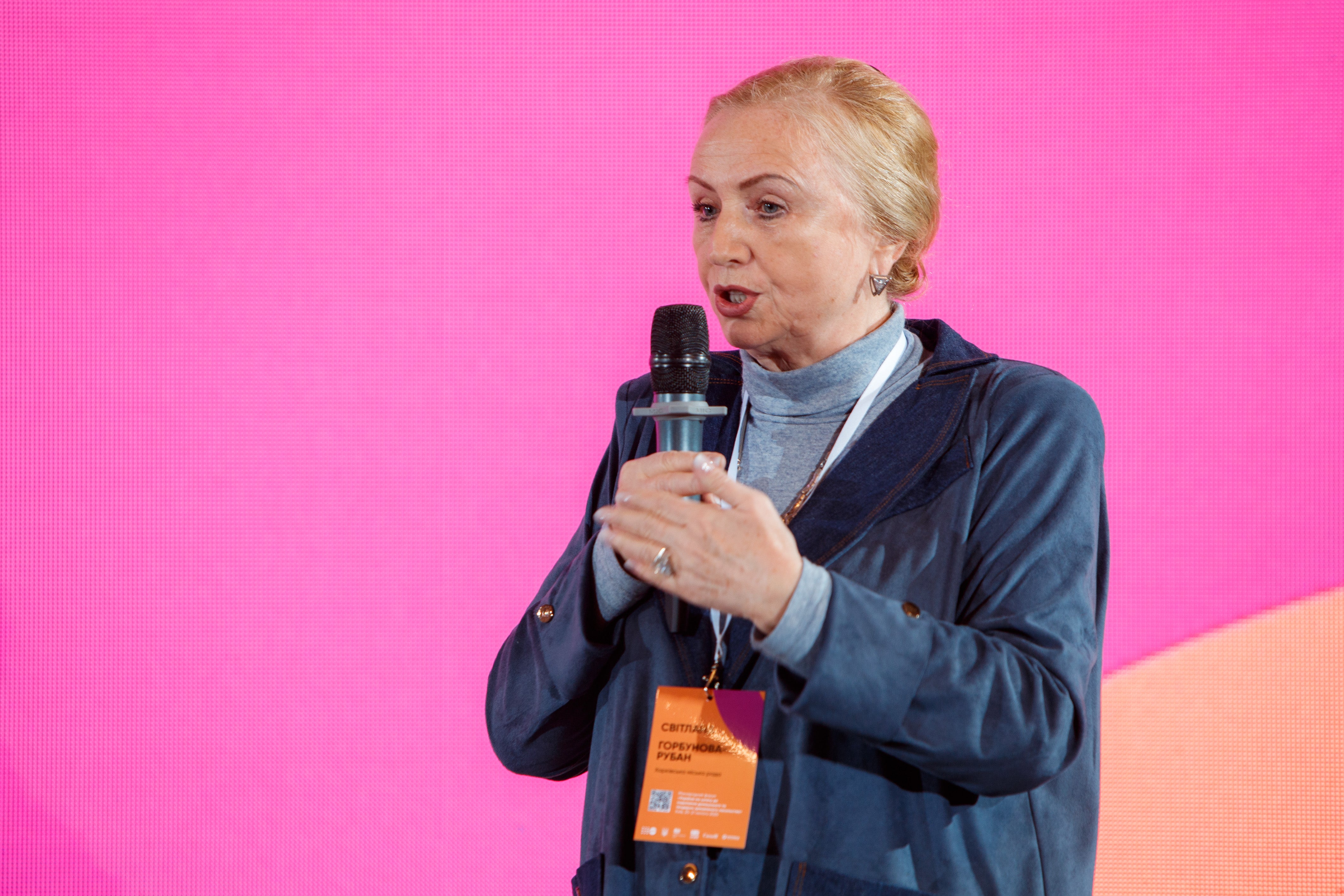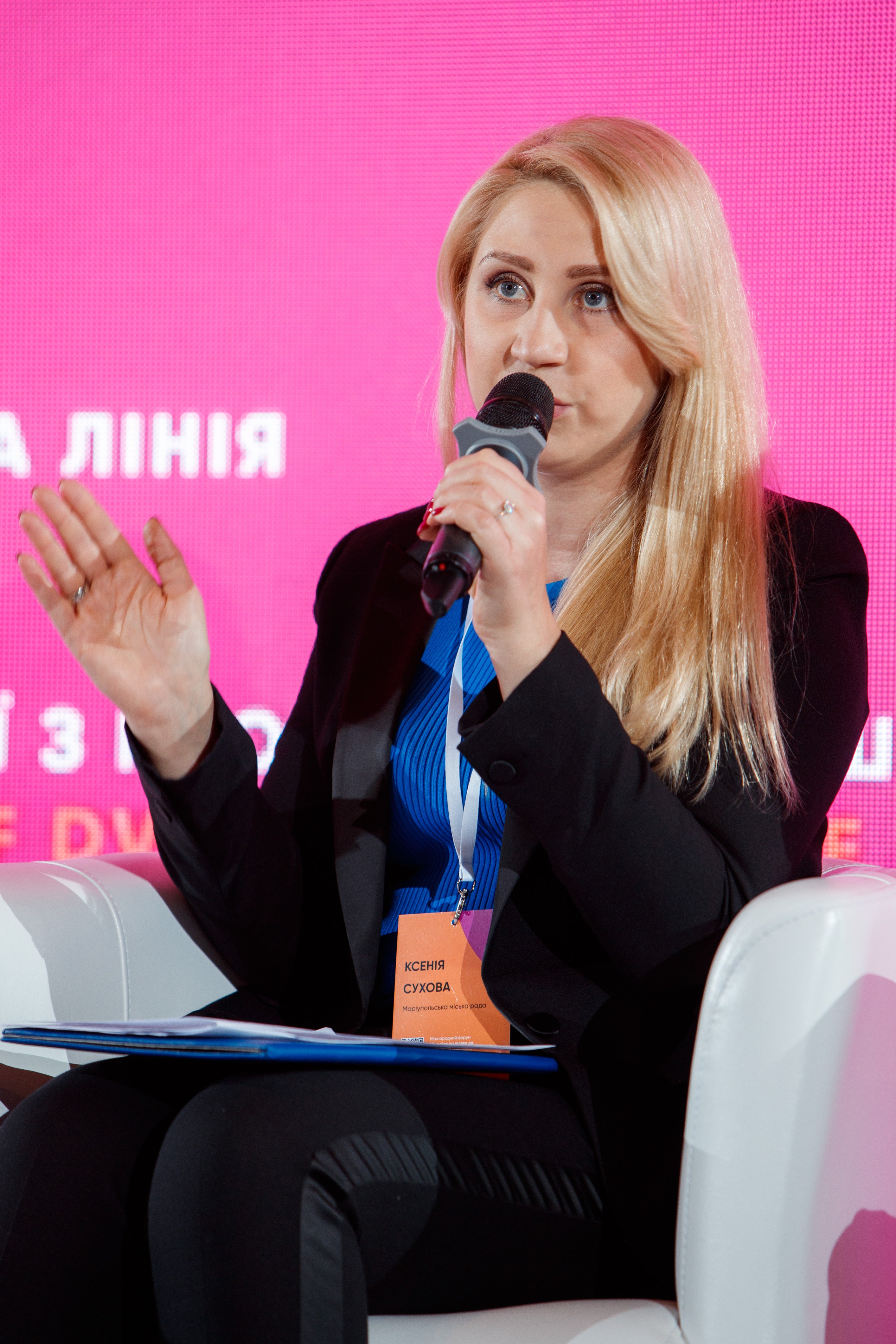A year ago, Olena* was convinced that keeping the family together was the most important thing. Her relationship with the husband deteriorated and became toxic due to the serious disease of their child. He began to take it out on the woman, and quarrels turned into beatings. Olena thought that things would change. After the tragic death of the child, the woman was in despair and did not want to live, because instead of giving support, the husband turned her life into a real hell. After another attempt to leave, Olena found herself in hospital with serious injuries, where psychologists and social workers began working with her. They persuaded her not to go back to the perpetrator, but to go to the city shelter opened under UNFPA’s program on preventing and combating domestic violence. Olena stayed there for 2 months until she found a job and rented an apartment.
Olena's story is not exceptional. According to a survey conducted by UNFPA in 2014, one in five women in Ukraine has suffered from sexual or physical violence. The war in Donbas exacerbated the problem, so in 2015, the United Nations Population Fund began its work in eastern Ukraine to prevent and address domestic violence.
“The idea of the program was to help Ukraine build a system for responding to domestic violence in an emergency situation - the conflict in Donbas," said UNFPA’s Regional Coordinator Kostiantyn Boychuk. “Then it turned out that domestic violence is a hidden problem, because survivors often do not seek help. There may be various reasons for this, one of them being the habit in society to shift responsibility from the offender to the survivor. We have also found large barriers to accessing services and a low level of interdepartmental cooperation in such cases. It even happened that the social service hid the survivor of violence while the police were looking for her at the request of the offender.”
He points out that there were very few trained specialists who would understand the specifics of working with survivors and be able to provide quality services.
According to him, another problem was the near absence of safe places where survivors of violence could wait for the danger to pass and where they would receive help in times of crisis.
"The survivors were housed in convents, placed in public organizations, but this was very far from international standards, which provide for a certain list of services and opportunities for them. Therefore, we decided to implement international experience in Ukraine and create a comprehensive system of assistance: to launch the work of mobile teams of social and psychological assistance, and then deploy a network of shelters, day crisis centers, and crisis rooms," adds Kostiantyn Boychuk.
Ukrainian know-how
The first step was the launch of mobile teams of social and psychological assistance. According to Kostiantyn, this is Ukrainian know-how.
"UNFPA specialists in Ukraine came up with this model. The point is to provide quality social and psychological assistance at the place of residence or location area of the survivor. This made the service more accessible, because in times of crisis, the survivor is concerned about the primary questions - what to eat, where to spend the night, and often does not even think about the need for help from a psychologist. Where this model was implemented, it was enough to make a call and a psychologist together with a social worker would come to the survivor's place of residence,” says the Regional Coordinator.
Kostiantyn Boychuk says that after the launch of mobile teams, they began to reveal thousands of cases of domestic violence, assess their needs (the survivors’ needs?) and provide assistance, so the need to create safe places for survivors became urgent. These are shelters providing the possibility of long-term stay as well as crisis rooms for the urgent housing of survivors.
"Crisis rooms are smaller than shelters, but they are easier to get to. This is a separate space, often an apartment, where you can accommodate the survivor without documents and medical certificates in the event of an emergency. For example, right in the middle of the night. And in the morning, you decide together with specialists how to proceed and provide assistance," says Boychuk.
According to him, crisis rooms are needed in times of crisis and danger to stay there for several days. And then, survivors often go to relatives or friends. If there are no such possibilities, the survivors are redirected to shelters.
You can see here how the crisis room works here: https://www.youtube.com/watch?v=CFJCZbnGsRI
Kostiantyn Boychuk is confident that failure to provide assistance in the first stage can lead to more serious consequences for both the survivor and the community in the city. According to UNFPA’s study called Economic Consequences of Violence Against Women in Ukraine and conducted in 2017, given the hidden nature of violence, the economic losses incurred by Ukrainian society as a result of violence against women reach up to $ 208 million per year. It should also be taken into account that, in the situation of systemic lack of shelters and specialized services for survivors of violence, most of the expenses resulting from violence fall on the shoulders of survivors themselves.
In 2018, the Government of Ukraine adopted a number of resolutions offering the above-mentioned specialized services to cities as tools to provide assistance to survivors based also on the experience of implementing the Fund's program. In the same year, the Fund's activities were scaled up. While before 2020, the program was implemented mostly at the regional level in 12 Ukrainian oblasts, namely Donetsk, Luhansk, Kharkiv, Dnipropetrovsk, Zaporizhia, Lviv, Vinnytsia, Kherson, Odesa, Kyiv, Mykolaiv, and Poltava, as well as in the city of Kyiv, this year, UNFPA decided to focus on working with cities.
"According to national legislation, the creation of mechanisms to combat domestic violence and protect survivors is entrusted to local authorities. Therefore, since 2017, cities are crucial for building a system to prevent gender-based violence. The Fund helps them build a comprehensive system of assistance to survivors of violence. We help, but do not do their job for them, mind you. Therefore, an important point for our partnership is the priority of this area for urban development. And we already have successful examples of implementing such an approach," says Kostiantyn Boychuk.
Kharkiv
Kharkiv was one of the first cities in Ukraine to start working with UNFPA to prevent domestic and gender-based violence in 2015.
This was very important because a large number of internally displaced persons moved to Kharkiv after the war broke out in Donbas. According to Boychuk, the city demonstrated its readiness to pilot new assistance models for Ukraine. As of now, Kharkiv has one of the most integrated systems of assistance to survivors of domestic violence in Ukraine. A coordinating body has already been created; a day center, a shelter, two crisis rooms, a hotline, a center for working with abusers and three mobile police groups for responding to domestic violence are functioning.
According to the Deputy Mayor of Kharkiv Svitlana Gorbunova-Ruban, the city has been implementing the program "Unified Social Network" for 20 years; this project brings together socially-oriented public organizations; there are more than 100 of them today.

Kostiantyn Boychuk confirms that at the outset of cooperation with Kharkiv, the city had a strong system of social work.
"It worked quite effectively even back in 2016, when the pressure on the social sphere was high in Ukraine. And the city was ready to test and implement a new one, despite the lack of a specialized law and regulations of the Cabinet of Ministers. This played a significant role in the success of the project implemented in the city," says UNFPA’s Regional Coordinator.
In November 2015, with the support of UNFPA, the city launched two mobile teams of psychosocial assistance, which became the first link in the comprehensive system to respond to the problem.
According to Boychuk, an important point was the launch of a specialized coordinating body in April 2016. Thus, the system of interdepartmental cooperation began to strengthen in the city.
In the same year, the first shelter complying with international standards was created with the support of UNFPA.
"This is a secret, safe place to accommodate 10 people at the same time. As of 2019, 176 people had used its services since its opening. It may seem like a small number, but we should not forget that one person can stay there for up to three months," Boychuk says.
In addition, since last year, the city has a day center and two crisis rooms, as well as Dovira (Ukrainian for “confidence”), a local hotline that also gives advice to survivors of domestic violence.
Mariupol
Mariupol is also one of the first cities in Ukraine to cooperate with UNFPA in the sphere of preventing domestic violence. According to Kostiantyn Boychuk, this is a successful example of an eastern city that pays considerable attention to this problem. During the three years of building a comprehensive system, the number of survivors’ appeals has doubled, and, according to him, it indicates a growth in the confidence of city residents. In 2017, 710 appeals for help were received, and in 2019, there were 1401 of them.
“Indicators are growing, but the figures do not reflect the reality”, says Deputy Mayor of Mariupol Kseniia Sukhova. “Not all survivors seek help so far. That is why our important task today is to create a circle of help around a person and not to let her walk around in circles looking for this help on her own.”

Kostiantyn Boychuk says that one of the most successful information campaigns was implemented in the city, which also influenced the growth in the number of appeals. Local authorities distributed information booklets and brochures, and the media launched several videos dedicated to addressing violence.
"We are informing people so the shameful phenomenon of domestic violence could be eliminated in Ukraine. We implement educational projects in Mariupol schools. This is an uncomfortable topic for discussions, but if we do not discuss it, we will never know the real scale of the problem and will not be able to help those who need assistance," says Kseniia Sukhova.
The first brick in the development of a comprehensive system of assistance to survivors of violence was the opening of a shelter in 2017. According to Kostiantyn Boychuk, the city has one of the most comfortable shelters in Ukraine. Mariupol was also the first to create a municipal mobile team, which works according to the approaches of the Fund's teams and is financed from the city budget. The coordinating council started to operate in 2018.
In addition, the city plans to open a day crisis center for psychological and social assistance this year.
"We have a clear action plan, we take mistakes into consideration and we know what needs to be improved. I am convinced that if all cities unite, we will be able to overcome the problem of violence in the country," says Deputy Mayor Kseniia Sukhova.
Odesa
Odesa joined the project in 2017 during its scaling. Kostiantyn Boychuk says that for the city community, work on preventing and combating domestic violence was a priority. And the city demonstrated readiness to work effectively.
Over the 3 years of implementation, Odesa has made long strides: a coordinating body has been established in the city, a day center and shelter for survivors have been opened, and the work of two mobile teams of psychosocial assistance and four mobile police groups has been launched to respond to domestic violence. Also, according to Regional Coordinator Boychuk, one of the indicators of success is the development of a three-year city target program in this sphere.
The City Council adopted a target program on the implementation of family and gender policy, prevention of domestic violence and combating human trafficking for 2019-2021. In general, Odesa allocates the largest amount of funding for the development of comprehensive assistance in comparison with other cities: almost 10 million hryvnias only for 2020.
The city plans to open another shelter and day crisis center, provide mobile teams with cars, train specialists and create a specialized hotline.
"The issue of domestic violence has been slurred over for a long time. Active work in this field began with the start of financial decentralization. This allowed resources to be channeled towards social projects. I am convinced that the city budget should be socially oriented. In two years of work, we have seen the dynamics of appeals double, which is due not only to the confidence of Odesa residents, but also to their personal involvement in addressing the problem,” said Svitlana Bedreha, Deputy Mayor of Odesa.

Kostiantyn Boychuk hopes that the experience gained in these cities will be used by other Ukrainian cities for the rapid development of the system of assistance to survivors of violence within communities.
"Odesa is developing faster, because it is possible to draw on the experience of Kharkiv, Mariupol and other cities the Fund cooperated with. The path is already clear. This year, the Fund selected 10 more new partner cities that demonstrated readiness to develop the systems for preventing and combating violence in their community. So, everything is still ahead," Boychuk is convinced.
UNFPA Ukraine’s Program of Combating and Preventing Domestic and Gender-Based Violence is funded by the governments of the United Kingdom, Canada and Estonia.
*The name is changed for privacy and security reasons.


